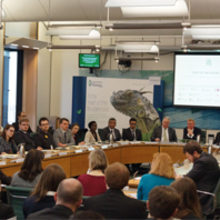Policy: Science policy update
Issue: Future Tech
09 August 2016 article

The Society’s policy team work to ensure appropriate scientific information and expert opinion is made available to policy-makers. We also engage in science policy to ensure that microbiology is supported as a discipline. Here is an overview of just some of our activities over a busy first half of 2016.
ANTIMICROBIAL RESISTANCE
Antimicrobial resistance (AMR) remains a key priority for our policy work. As a founding member of the Learned Society Partnership on AMR (LeSPAR) we aim to support research and present a unified scientific voice on AMR. Meeting with research funders and policy-makers, the Societies have been highlighting issues and ideas raised by our collective memberships at a series of interdisciplinary LeSPAR workshops held last year.
In February, the Microbiology Society was invited to a stakeholder workshop in Brussels about the European Union’s AMR Action Plan; there was interest in the report from our LeSPAR workshops and we were able to highlight the importance of research and the environmental dimension of AMR.
In May, the Society endorsed recommendations made by Lord O’Neill’s independent review on AMR, including building AMR research capacity and raising global awareness.
POLICY CONSULTATION RESPONSES
Our consultation response to the House of Commons Environmental Audit Committee UK Soil Health inquiry in January highlighted environmental microbiology, while our joint response with the Society for Applied Microbiology to the House of Commons Science and Technology Committee inquiry on Science in emergencies: UK Lessons from Ebola saw several issues our members raised, such as better drawing on and supporting microbiology volunteers in disease emergencies, cited in the Committee’s report. We also highlighted our forward-thinking Antibiotics Unearthed outreach project in our response to the Committee’s Science Communication inquiry.
View our consultation responses on our website.
LINKING MICROBIOLOGISTS AND POLICY-MAKERS
Early-career members questioned leading UK politicians on science policy at Voice of the Future 2016. Members Professor Mike Skinner and Professor Wendy Barclay attended a Parliamentary and Scientific Committee meeting on the safety of pathogen research. Society staff and members also attended Parliamentary Links Day at the UK Parliament and Science and the Assembly in Wales.
The Society is also represented on several external policy committees and groups. Professor Dawn Arnold was elected to the advisory committee of the UK Plant Sciences Federation, while Dr John McGrath replaced Dr Nigel Ternan as the Society’s representative on the Northern Ireland Learned Societies and Professional Bodies Forum.
FUNGAL DISEASES AND MICROBIOMES
We continue to proactively highlight important microbiology issues and research to policy-makers through our series of policy briefings, including our one on Human Fungal Diseases, which was sent to UK and Irish policy-makers.
All briefings are accessible on our website.
The Society has also established a Microbiome Expert Working Group, chaired by Professor Julian Marchesi, to produce a major evidence-based document for policy-makers, which will explore the research on human, animal and environmental microbiomes.
PAUL RICHARDS
Policy Officer
[email protected]
Get involved
Our policy work depends on the expertise and input of our members. It is a great way to promote microbiology and increase its impact. Contact the team at [email protected] to find out how to get involved or flag an issue. Keep an eye on the monthly newsletter and our website for policy news, opportunities and resources.
Image: Voice of the Future 2016. Royal Society of Biology..
